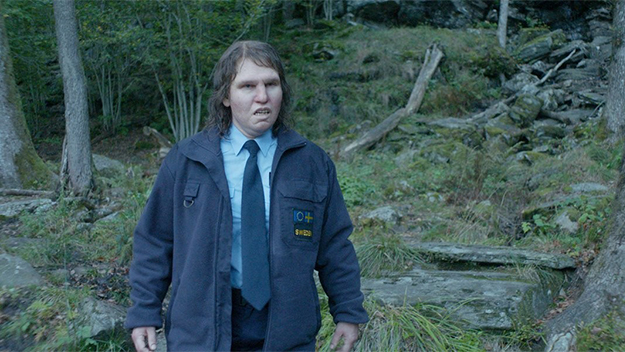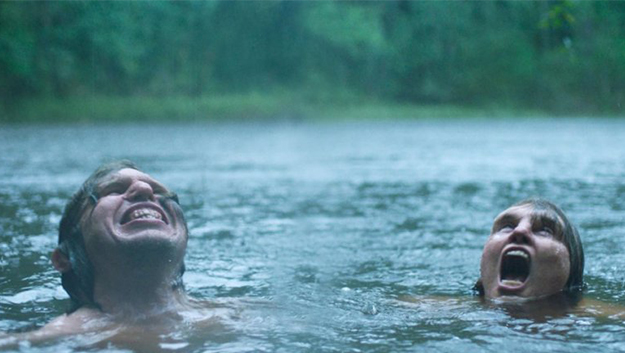Review: Border

The protagonist of Ali Abbasi’s second feature, Border, Tina is somewhat odd-looking: her lumpy face, sunken eyes, and whetted teeth elicit cruel insults from strangers. A customs inspector in a remote, woodsy part of Sweden, she has an X-Men–esque ability to smell people’s intentions—a gift that makes her invaluable to port security but, as is the case with freakish powers in movies, compounds her sense of out-of-place-ness. Tina eventually discovers that this is all linked to her true identity as (it turns out) a troll. She’s one of the few remaining survivors of a supernatural species persecuted and decimated by humans a few decades earlier.
The film’s ambitious sweep of ideas makes allegorical nods to various timely sociocultural issues, from the oppression of immigrants to the ostracization of racial and sexual minorities. But Border is less invested in glib symbolism or political commentary than in the specific, felt experience of being adrift between social boundaries and categories—and in the thrill of reclaiming one’s identity from those lost spaces. (“I don’t like people who can’t say what they mean without metaphors,” said Abbasi in a recent interview with Film Comment, emphasizing that he approached the film as the story of “a woman who’s lonely and looking for love, and happens to have an extraordinary nose.”) Itself a hard-to-categorize blend of mytho-fantasy, romance, and crime drama, Border is perhaps most resonant as a kind of queer cinema—especially in the way that it locates desire as the cosmic force that awakens Tina to her own self.
Border opens with images of Tina’s everyday life: a dull, routinized existence in which even the most extraordinary aspect of her being—her sense of smell—has been instrumentalized into a glorified metal detector. Uniform-clad, she stands in the sterile hallway of the port, her face twitching in the fluorescent light as she sniffs out guilty passengers—first an underage drinker, then a suavely dressed child porn smuggler. Later, she returns home to her oblivious, deadbeat boyfriend Roland (an amusingly douchey Jörgen Thorsson), pawing miserably at her dinner as he yaps on and on about his show dogs. She also makes regular, dutiful visits to her near-senile father (Sten Ljunggren) at an old people’s home, where their tender exchanges are undercut by the melancholic sense that she’s slowly losing perhaps the only person in the world that truly loves her.
There’s a labored and repressive quality to Tina’s “normalcy,” familiar, to some degree, to anyone who’s ever had to assimilate into a culture to which they don’t belong. With Melander providing an impressively perceptive and bone-deep performance from underneath all the prosthetics, Tina seems to go through her days as an uneasy, silent observer of the world—eternally unfulfilled but unable to articulate what exactly she’s missing. The only moments in which she appears animated are her serendipitous encounters with the natural realm, whose colors and textures are rendered crisp and sensuous by cinematographer Nadim Carlsen. Tina stands outside her cottage at one point, peering in through the window like a visitor to her own home, when a ginormous elk quietly appears at her shoulder. Later, she wakes up in the middle of the night to share a gentle, whimsical moment with a fox outside her frosty bedroom window. In these scenes, Abbasi and Carlsen mine the Nordic woods for their folkloric possibilities, with shapes emerging from the shadows and dissolving into the dark.
Tina partakes in these encounters with the wariness of someone alien to their own impulses—until, one day at the port, she meets Vore (Eero Milonoff), a man whose face bears remarkable physiognomic similarities to hers. His arrival is a moment of profound destabilization for Tina; it sends her olfactory senses into a tizzy, which Melander, framed in a visceral close-up, renders as a veritable choreography of nostril-twitching. Alarmed and aroused all at once, Tina probes further, unearthing even more similarities between them: androgynous sexual organs; a scar above the hip; burn marks left by lightning strikes. “Who are you?” she asks, a thinly veiled prelude to her later question, “Who am I?”
Their ensuing courtship shares the broad contours of many a coming-of-age film, queer or otherwise: Vore is the brazen yet mysterious lover who draws the diffident, inexperienced Tina out of her shell and into self-discovery. But Abbasi’s attention to mythical detail—and the bodily conviction with which Milonoff and Melander inhabit the boundary between human and non-human—make the scenes between the two characters’ feel rivetingly original. Their initial interactions are charged with the quiet, imperceptible frenzy of smell; like animals, they scope each other out with their noses, standing close yet wary. Slowly, Vore coaxes Tina into her natural impulses, starting by offering maggots to eat. (“That’s gross,” she says. “Says who?” he asks defiantly). Soon after, they’re cowering underneath a table together during a thunderstorm, limbs all entangled, trying to escape the lightning that’s chasing them; and soon after that, they’re having wild, feral sex deep in the forest. 
That sex scene—much discussed since the film’s premiere at Cannes—is the high point of Border: a moment of pure, revelatory jouissance, triumphantly culminating in Tina’s gradual awareness of her body and its capacity for desire. It’s also fairly outré, featuring graphic nudity, an unexpected CGI enhancement, and plenty of guttural roaring and grunting. It’s yet another example of Abbasi’s refreshing commitment to his characters’ fantastical Otherness: instead of imposing an anthropomorphism onto their sexualities, he attempts a more genuine, norm-bending rearrangement of our conceptions of the grotesque and the erotic. Melander and Milonoff are also, once again, essential to the scene’s effectiveness; they embody animalistic desire without veering into parody or pathos.
Border is adapted from a novella by John Ajvide Lindqvist, the writer behind Tomas Alfredson’s cult teen-vampire movie, Let the Right One In (2008). Like that film, Border forays into some truly dark territory, with a crime ring subplot that—though slightly contrived—complicates the film’s mystery of identity in productive, provocative ways. Even after having discovered her origins, Tina finds herself confronting deeper questions about who she is—and who she wants to be. “I don’t want to hurt people. Is that human?” she asks Vore at the end of the film. Identity, Abbasi seems to suggest, is far more elusive than the categories of gender and genetics—and that the borders we draw for ourselves are sometimes more important than the boxes into which we’re placed.
Devika Girish is a freelance film critic. She grew up in India and currently lives in Los Angeles.




